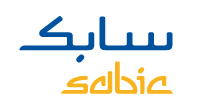
27 Nov 2012
SABIC's commitment to sustainability reflected at Doha expo, led by CEO
SITTARD, The Netherlands, November 27, 2012 - The Saudi Basic Industries Corporation (SABIC) is participating in the Qatar Sustainability Expo, which coincides with the United Nations Framework Convention on Climate Change (UNFCCC), in Doha from November 26 to December 7.
Abdullah bin Hamad Al-Attiyah, President of COP18/CMP8, visited the SABIC stand during the inaugural ceremonies. He was accompanied by Dr. Mohammed bin Saleh Al-Sada, Minister of Energy and Industry, and Christiana Figueres, UNFCCC Executive Secretary. They were received by Dr. Dafer-Al Talaat, SABIC Vice President, Middle East and Africa, on behalf of Mohamed Al-Mady, SABIC Vice Chairman and CEO, Khalid Abuleif, Sustainability Advisor to the Saudi Minister of Petroleum and Mineral Resources and Chief Negotiator for Climate Agreements.
Alongside the conference and expo, where SABIC is a major exhibitor, Mohamed Al-Mady will be participating in a panel discussion as part of the ‘Doha Business Day’ on December 3. Together with other industry experts and thought leaders, Al-Mady will be joining in the debate entitled, ‘Innovative Business Models in the Middle East’. The session will be moderated by Peter Bakker, President of the World Business Council for Sustainable Development.
Speaking on SABIC’s participation at the conference and the importance of sustainability for the company, Al-Mady said, “SABIC’s future growth and development depends on creating solutions for the major issues facing society today and tomorrow – successful solutions that create value for society and in turn, for our business.”
The SABIC display forms part of the wider Saudi Arabia pavilion at the Doha Exhibition Center, featuring six other Saudi Arabian businesses and organizations. Its aim is to demonstrate Saudi Arabia’s active engagement with carbon management and climate control.
The SABIC exhibit, overseen by key members of SABIC’s sustainability team, utilizes state-of-the-art technology to bring to life the company’s sustainability efforts. Digital displays demonstrate working examples of energy saving and carbon reduction. This includes the Range Rover ‘Evoque’, where SABIC material solutions have been used in its manufacture to contribute to reduce the vehicle’s overall weight by 35 percent.
The expo is expected to attract around 20,000 visitors, while the convention brings together key decision makers, environmental experts, non-government organizations, business leaders and industry experts. They aim to secure progress in the UN climate change negotiations and support developing countries in adapting to the inevitable effects of climate change.
Reader enquiries
Communications Manager
Notes for editors
• SABIC is a registered trademark of SABIC Holding Europe B.V.
• High-resolution photos are available upon request
• SABIC should be written in every instance in all uppercase.
About SABIC
Saudi Basic Industries Corporation (SABIC) ranks among the world’s top petrochemical companies. The company is among the world’s market leaders in the production of polyethylene, polypropylene and other advanced thermoplastics, glycols, methanol and fertilizers.
SABIC recorded a net profit of SR 29.24 billion (US$ 7.80 billion) in 2011. Sales revenues for 2011 totaled SR 189.90 billion (US$ 50.64 billion). Total assets stood at SR 332.78 billion (US$ 88.74 billion) at the end of 2011.
SABIC’s businesses are grouped into Chemicals, Polymers, Performance Chemicals, Fertilizers, Metals and Innovative Plastics. SABIC has significant research resources with 16 dedicated Technology & Innovation facilities in Saudi Arabia, the USA, the Netherlands, Spain, Japan, India and South Korea. The company operates in more than 40 countries across the world with around 40,000 employees worldwide.
SABIC manufactures on a global scale in Saudi Arabia, the Americas, Europe and Asia Pacific.
Headquartered in Riyadh, SABIC was founded in 1976 when the Saudi Arabian Government decided to use the hydrocarbon gases associated with its oil production as the principal feedstock for production of chemicals, polymers and fertilizers. The Saudi Arabian Government owns 70 percent of SABIC shares with the remaining 30 percent held by private investors in Saudi Arabia and other Gulf Cooperation Council countries.
Related images
Editorial enquiries
Roos Hunsche
SABIC
Communications Manager
roos.hunsche@SABIC-europe.com
Kevin Noels
Marketing Solutions NV

